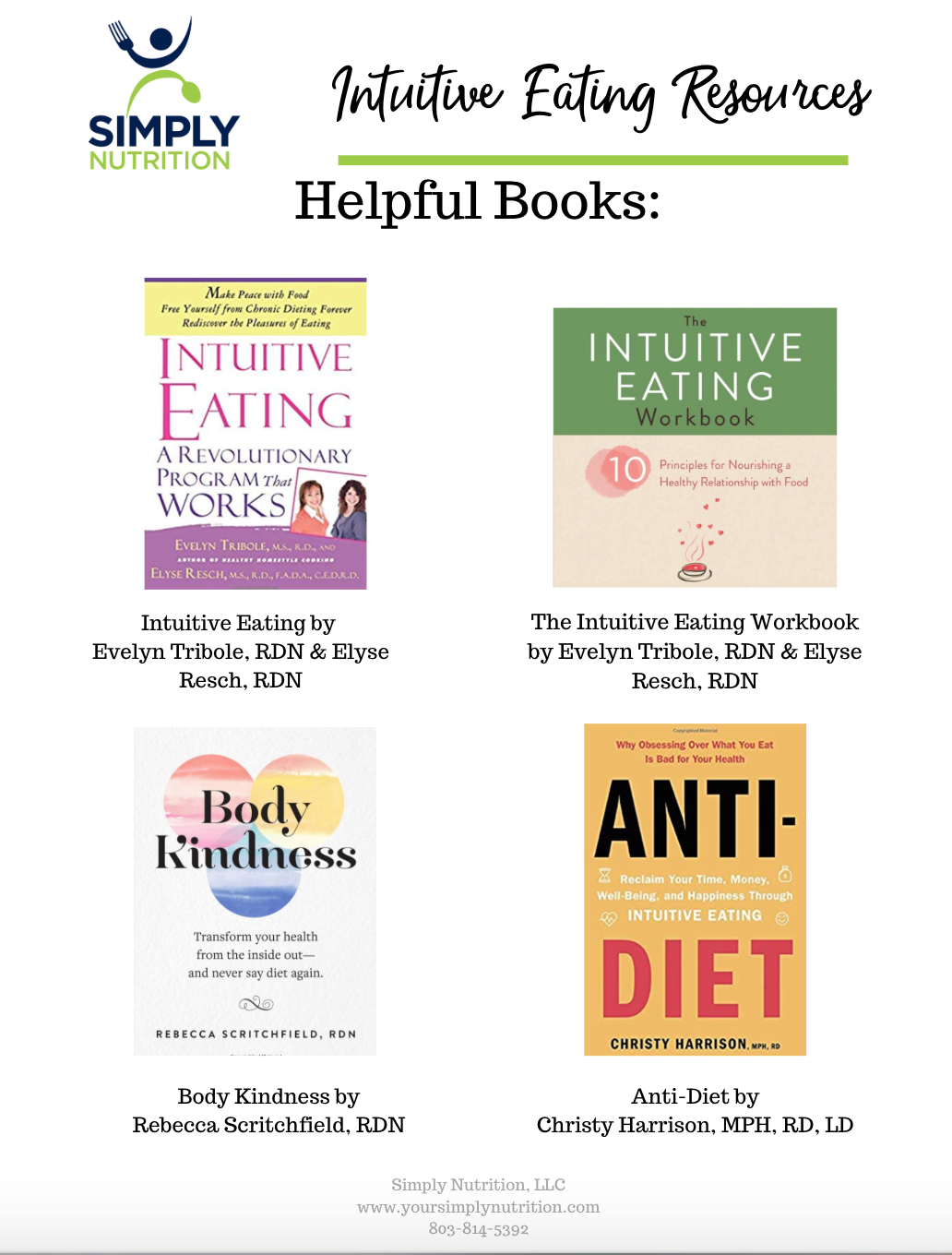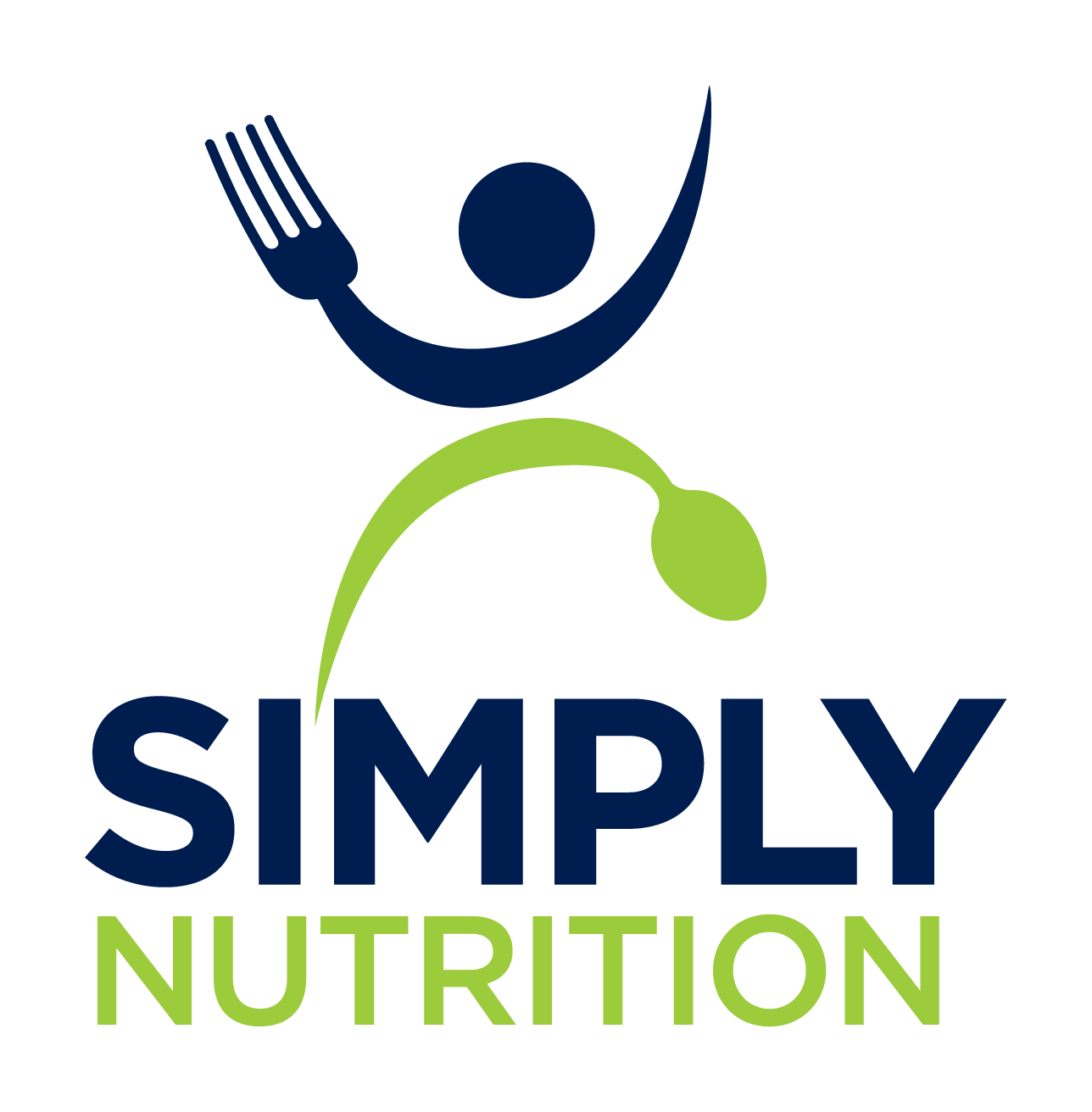An intro to Intuitive Eating!
Posted on March 10, 2020 at 1:19 pm | General Wellness | Intuitive Eating | simplynutrition
What exactly is “Intuitive Eating”?
Caroline, here – In addition to being a Dietitian, I am also a Certified Intuitive Eating Counselor, which simply means I am lucky enough to have been able to receive extra training in helping my clients on their journeys with intuitive eating. So I figured I’d share a little introduction into what intuitive eating exactly is, for those that maybe have heard the term, but aren’t too sure what it means. Here we go!
In a nutshell, intuitive eating is an evidence-based framework for a healthy relationship to food & your body. It was developed in the 1990s by two fabulous Dietitians, Evelyn Tribole & Elyse Resch.
Intuitive eating is simply put, a way to fuel and nourish your body FREE from diet rules or external cues. We are all born as natural intuitive eaters, just think about how infants and toddlers eat –they cry when they’re hungry, stop when they’ve had enough, and move on. But as we grow up, our relationship to food gets muddled with external influence of food rules, the media, the thin ideal, dieting, friends and family, and more.
Diets don’t work.
Did you know? There is extensive research showing that diets not only don’t work, but are harmful, too. And did you know that research shows the more someone diets, the more weight gain they tend to have? A simple way to explain Intuitive Eating is that it is simply “normal eating”, before dieting or food rules get involved. Intuitive eaters listen to INTERNAL cues to eat (such as hunger, fullness, and satisfaction) instead of EXTERNAL cues to eat (like a meal plan, counting calories or macros, rigid food rules, dieting, etc.).
Intuitive eating puts YOU back in charge. It teaches you that you CAN trust your body and it WILL tell you what it wants and needs to feel good. There are countless benefits to intuitive eating also.
Research shows intuitive eating is linked with:
- Decreased disordered eating
- Improved body image
- Improved lipid and blood glucose levels
- Decreased blood pressure
- Increased food satisfaction & enjoyment with eating
- Decreased binge eating & emotional eating
- Increased body trust
- Decreased BMI (without obsessing over the thin ideal)
- Increased self-esteem
- Intake of more variety of foods
On the other hand, research has proved that dieting is linked with some harmful effects.
Research shows that dieting is linked with:
- Increased Binge eating
- Decreased Metabolic Weight
- Yo-Yo Effect with Weight
- Increased preoccupation with food
- Decreased sense of willpower
- Increased feelings of deprivation
- Increased feelings of failure and
- guilt
- Increased risk of disordered eating
Overall, intuitive eating is based upon 10 helpful principles (listed below), in no particular order, that help guide you on your journey to intuitive eating. Remember, it doesn’t happen overnight, and it’s helpful to work with a professional who is trained if you’re ready to heal your relationship to food.
(Download our handout on the principles here)
1. Reject the Diet Mentality. Throw out the diet books and magazine articles that offer you false hope of losing weight quickly, easily, and permanently. Get angry at the lies that have led you to feel as if you were a failure every time a new diet stopped working and you gained back all of the weight. If you allow even one small hope to linger that a new and better diet might be lurking around the corner, it will prevent you from being free to rediscover Intuitive Eating.
2. Honor Your Hunger. Keep your body biologically fed with adequate energy and carbohydrates. Otherwise you can trigger a primal drive to overeat. Once you reach the moment of excessive hunger, all intentions of moderate, conscious eating are fleeting and irrelevant. Learning to honor this first biological signal sets the stage for re-building trust with yourself and food.
3. Make Peace with Food. Call a truce, stop the food fight! Give yourself unconditional permission to eat. If you tell yourself that you can’t or shouldn’t have a particular food, it can lead to intense feelings of deprivation that build into uncontrollable cravings and, often, bingeing When you finally “give-in” to your forbidden food, eating will be experienced with such intensity, it usually results in Last Supper overeating, and overwhelming guilt.
4. Challenge the Food Police. Scream a loud “NO” to thoughts in your head that declare you’re “good” for eating under 1000 calories or “bad” because you ate a piece of chocolate cake. The Food Police monitor the unreasonable rules that dieting has created . The police station is housed deep in your psyche, and its loud speaker shouts negative barbs, hopeless phrases, and guilt-provoking indictments. Chasing the Food Police away is a critical step in returning to Intuitive Eating.
5. Respect Your Fullness. Listen for the body signals that tell you that you are no longer hungry. Observe the signs that show that you’re comfortably full. Pause in the middle of a meal or food and ask yourself how the food tastes, and what is your current fullness level?
6. Discover the Satisfaction Factor. The Japanese have the wisdom to promote pleasure as one of their goals of healthy living In our fury to be thin and healthy, we often overlook one of the most basic gifts of existence–the pleasure and satisfaction that can be found in the eating experience. When you eat what you really want, in an environment that is inviting and conducive, the pleasure you derive will be a powerful force in helping you feel satisfied and content. By providing this experience for yourself, you will find that it takes much less food to decide you’ve had “enough”.
7. Honor Your Feelings Without Using Food. Find ways to comfort, nurture, distract, and resolve your issues without using food. Anxiety, loneliness, boredom, anger are emotions we all experience throughout life. Each has its own trigger, and each has its own appeasement. Food won’t fix any of these feelings. It may comfort for the short term, distract from the pain, or even numb you into a food hangover. But food won’t solve the problem. If anything, eating for an emotional hunger will only make you feel worse in the long run. You’ll ultimately have to deal with the source of the emotion, as well as the discomfort of overeating.
8. Respect Your Body. Accept your genetic blueprint. Just as a person with a shoe size of eight would not expect to realistically squeeze into a size six, it is equally as futile (and uncomfortable) to have the same expectation with body size. But mostly, respect your body, so you can feel better about who you are. It’s hard to reject the diet mentality if you are unrealistic and overly critical about your body shape.
9. Exercise–Feel the Difference. Forget militant exercise. Just get active and feel the difference. Shift your focus to how it feels to move your body, rather than the calorie burning effect of exercise. If you focus on how you feel from working out, such as energized, it can make the difference between rolling out of bed for a brisk morning walk or hitting the snooze alarm. If when you wake up, your only goal is to lose weight, it’s usually not a motivating factor in that moment of time.
10 Honor Your Health. Gentle Nutrition Make food choices that honor your health and tastebuds while making you feel well. Remember that you don’t have to eat a perfect diet to be healthy. You will not suddenly get a nutrient deficiency or gain weight from one snack, one meal, or one day of eating. It’s what you eat consistently over time that matters, progress not perfection is what counts.
Want to learn more? Book a personalized nutrition session by calling or emailing us, or by booking easily online. I would also highly recommend reading the original book titled Intuitive Eating by Evelyn Tribole and Elyse Resch, and you can also check out their Intuitive Eating workbook for helpful exercises you can do on your own!
Adapted with permission from: Tribole E and Resch E. Intuitive Eating, 2nd ed. (1995, 2003), NY:NY. www.IntuitiveEating.org




